History Fall
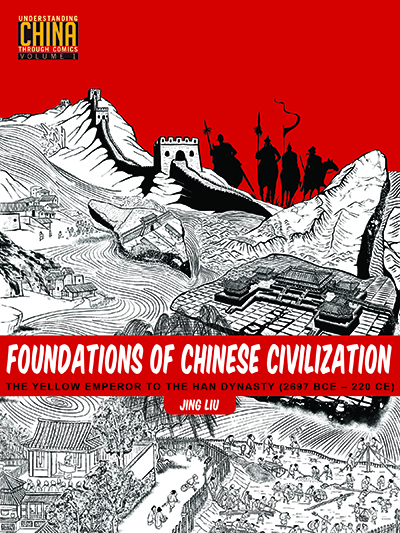 Foundations of Chinese Civilization: The Yellow Emperor to the Han Dynasty (2697 BCE - 220 CE)
Foundations of Chinese Civilization: The Yellow Emperor to the Han Dynasty (2697 BCE - 220 CE)
Understanding China through Comics, Book 1 – Online Book Group
by Jing Liu
September 18 - October 8, 2019
3 Sessions; 6 PD Hours
Moderator: Karen Kane
This first book in the Understanding China Through Comics series, covers a graphic history of China's earliest times, introducing philosophies like Confucianism and Daoism, the story of the Silk Road, the Qin and Han Dynasties, and the process of China's unification. Author and artist Jing Liu uses strong ink art and a storyteller's feel for pace and plot to depict storylines ranging from the political and economic to the cultural and personal. The result is a book that doesn't just recount the history of China, but leaves readers with a nuanced understanding of a deeply rich period of time.
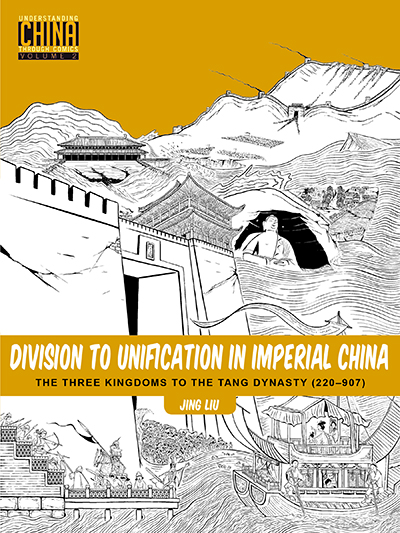 Division to Unification in Imperial China: The Three Kingdoms to the Tang Dynasty (220-907)
Division to Unification in Imperial China: The Three Kingdoms to the Tang Dynasty (220-907)
Understanding China through Comics, Book 2 – Online Book Group
by Jing Liu
October 9 – October 29, 2019
3 Sessions; 6 PD Hours
Moderator: Karen Kane
This second volume in the Understanding China Through Comics series explores the Age of Division, a period of civil wars and foreign invasions, to the Golden Age of the Tang Dynasty – at the time the most powerful empire in the world – and its ultimate collapse. The same era saw the spread of new ideas and religions, like the Profound Learning movement, Buddhism, and Taoism.
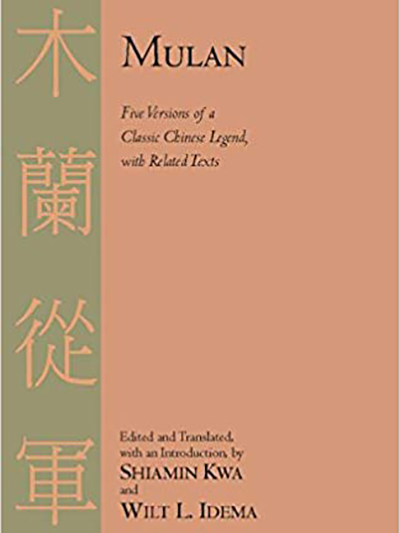 Mulan: Five Versions of a Classic Chinese Legend
Mulan: Five Versions of a Classic Chinese Legend
Understanding China through Drama – Online Book Group
by Shiamin Kwa and Wilt L. Idema (Translators)
October 23 - November 19, 2019
4 Sessions; 8 PD Hours
Moderator: Lynn Kalinauskas
The legend of Mulan – the daughter who disguises herself as a man in father's armor and heads off to war – remains one of the most popular Chinese folktales despite (or because of) its lack of supernatural forces.
This volume offers lively translations of the earliest recorded version of the legend and several later iterations of the tale (including the screenplay of the hugely successful 1939 Chinese film Mulan Joins the Army), illustrating the many ways that reinterpretations of this basic story reflect changes in Chinese cultural, political, and sexual attitudes.
The course will trace the evolution of the Mulan legend and its significance in the history of Chinese popular culture. The text offers annotations explaining terms and references unfamiliar to Western readers, a glossary, and a comprehensive bibliography which will further enhance the value of bringing this book to your classroom and students.
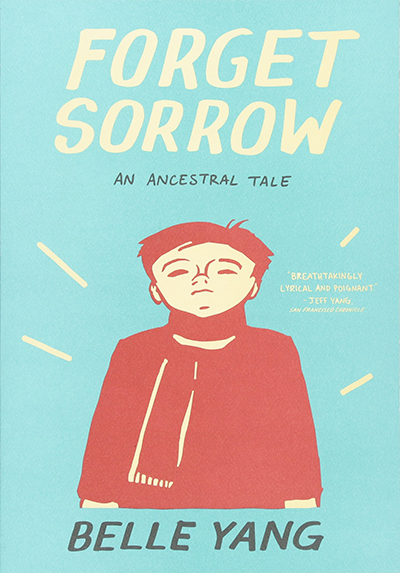 Forget Sorrow: An Ancestral Tale
Forget Sorrow: An Ancestral Tale
Understanding China through Graphic Novels – Online Book Group
by Belle Yang
November 20 – December 17, 2019
4 Sessions; 8 PD Hours
Moderator: Karen Kane
This graphic novel follows the story of Belle, nicknamed “Forget Sorrow” to mark a new beginning for her family in America. Upon her return from college, Belle’s finds comfort in her father's tales of his family's plight in Manchuria during the Second World War. Bell's great grandfather, "the Patriarch," had lorded over a prosperous estate before conflict, famine, and later, Communist oppression diminished his power and divided his family. "In wonderfully dreamy – and often nightmarish – black-and-white images" (San Francisco Chronicle), Belle finds the strength to honor both her father and herself in recalling the lives of her ancestors.
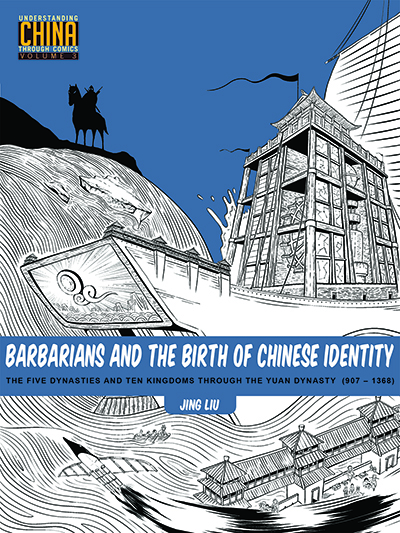 Barbarians and the Birth of Chinese Identity: The Five Dynasties and Ten Kingdoms to the Yuan Dynasty (907 - 1368)
Barbarians and the Birth of Chinese Identity: The Five Dynasties and Ten Kingdoms to the Yuan Dynasty (907 - 1368)
Understanding China through Comics, Book 3 – Online Book Group
by Jing Liu
January 8 - January 28, 2020
3 Sessions; 6 PD Hours
Moderator: Karen Kane
The third volume of this series on Chinese history quickly summarizes the previous installments before starting its coverage of the Five Dynasties and Ten Kingdoms period (907–960 CE), the Song Dynasty (960–1279 CE), and the Yuan Dynasty (1206–1368 CE). While addressing political and geographic upheavals, Liu reveals just enough information to make readers aware of the devastating effects of being conquered, without getting into details that might be too upsetting for younger audiences. He also touches on the theory that the practice of foot-binding was started to protect women, as the custom rendered them unable to ride a horse, making them harder to kidnap as trophies of war. Liu focuses on the foreign invasions that mark this period and the resulting academic, governing, and economic changes that were made to give the people a sense of Chinese cultural and national identity.
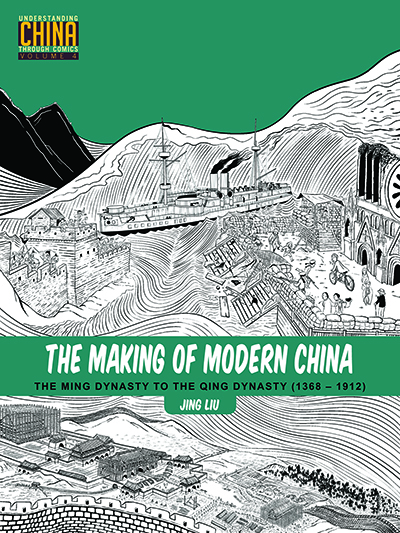
The Making of Modern China: The Ming Dynasty to the Qing Dynasty (1368-1912)
Understanding China through Comics, Book 4 – Online Book Group
by Jing Liu
January 29 – February 18, 2020
3 Sessions; 6 PD Hours
Moderator: Karen Kane
This fourth volume in the Understanding China Through Comics series covers the stunningly productive Ming dynasty and its fall to the Manchus under the Qing, the last Chinese dynasty. The book also addresses Wang Yangming's School of Mind and the painful process of modernization and conflict with the West and Japan, including the Opium Wars and the Boxer Rebellion.
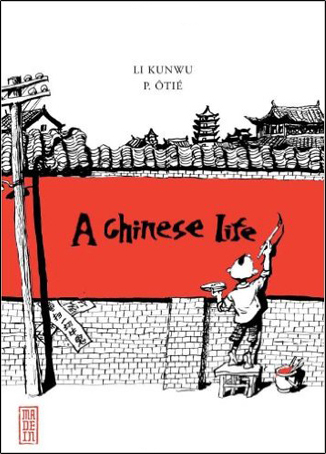 A Chinese Life
A Chinese Life
Understanding China through Graphic Novels – Online Book Group
Written by Philippe Ôtié and Li Kunwu, Illustrated by Li Kunwu, Translated by Edward Gauvin
February 19 - April 14, 2020
8 Sessions; 16 PD Hours
Moderator: Karen Kane
An autobiography in graphic-novel form. A Chinese Life traces a remarkable personal journey through modern history, form the creation of the People's Republic of China in 1949 to the present day. Working in close collaboration with writer Philippe Ôtié , artist Li Kunwu has created a timely and compelling memoir of state and self that is at once epic and intimate, comic and tragic, in scope.